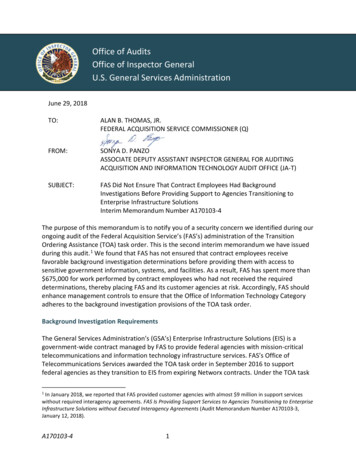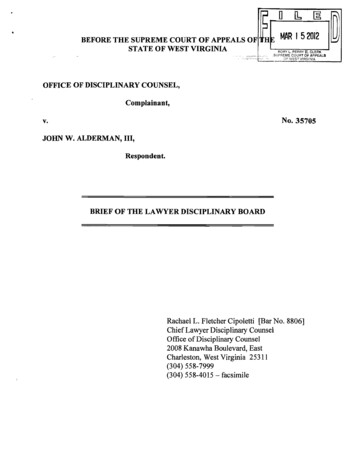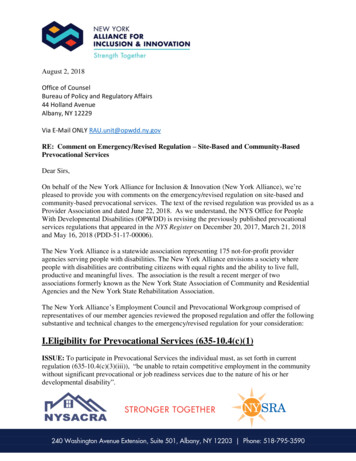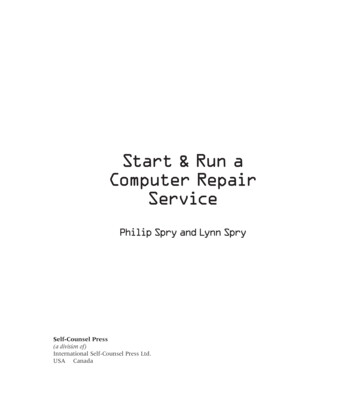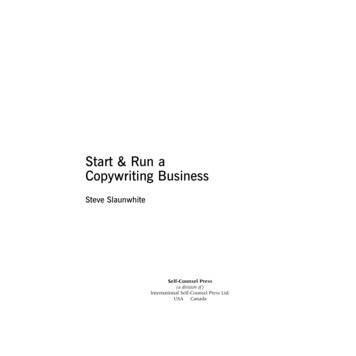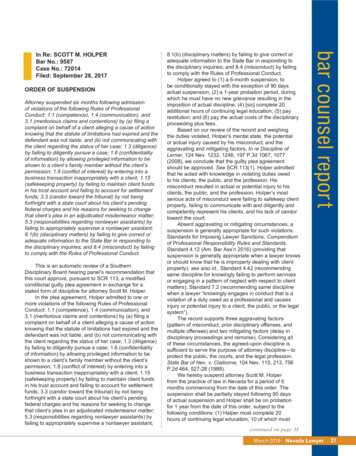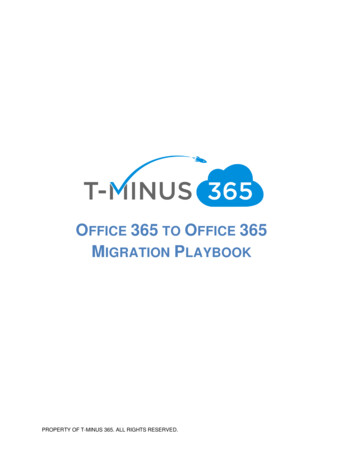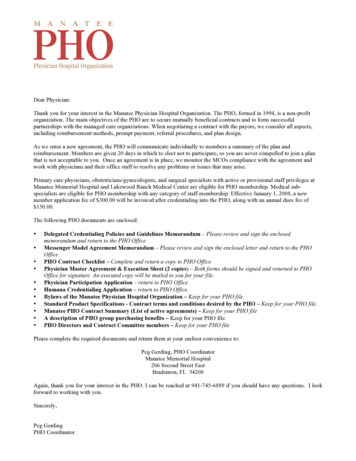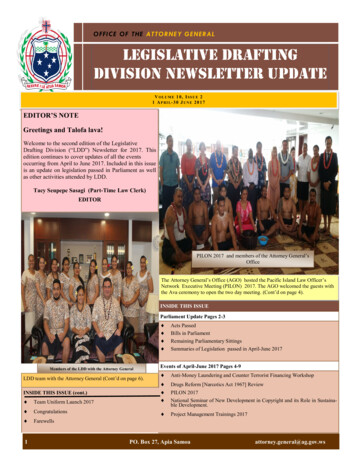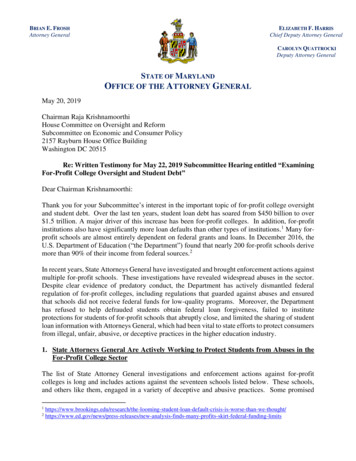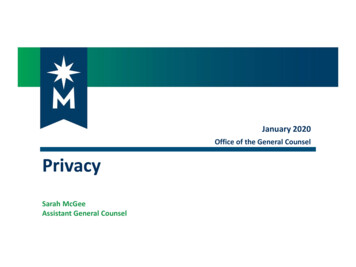
Transcription
January 2020Office of the General CounselPrivacySarah McGeeAssistant General Counsel
What isPrivacy?4
The Right to Privacy “The right to be left alone”– Samuel Warren & Louis Brandeis, 1890 Harvard Law Review “The state or condition of being free from being observed or disturbed byother people.”– Oxford Dictionary “Having control over how information flows”– danah boyd, "Making Sense of Privacy and Publicity”. SXSW, March 13, 2010 “The right to be let alone, or freedom from interference or intrusion.Information privacy is the right to have some control over how yourpersonal information is collected and used.”– IAPP Privacy consists of (1) an individual’s ability to conduct activities withoutconcern of or actual observation and (2) the appropriate protection, use,and release of information about individuals.– University of California Statement of Privacy Values5
Why is Privacy Important Autonomy and individuality – control over our own lives If you lived your life under observation, what wouldchange?– Less likely to try new things?– More afraid to act politically? Privacy is a limit on power (both by government andprivate companies) Academic and intellectual freedoms – the ability to speakand research without intimidation – are at the heart ofour mission.6
What’s the Difference Between Privacy andSecurity?PrivacyThe rights you haveto control yourpersonal informationand how its used.7SecurityHow your personalinformation isprotected frombreach orexploitation.Security isnecessary, butnot sufficientfor addressingprivacySale or sharing ofyour personalinformation might bea privacy violation,but not a securityviolation.
How Do You Increase Your Privacy?Online:8 Turn off tracking Disable locationservices, WIFI andBluetooth Choose vendorscarefully VPN (maybe) Fictitious names anddates End-to-end encryption Strip photos of EXIFdata Opt out of interestbased trackingOffline: Post office box orcommercial mailreceiving agency Unlisted phonenumber Tinted windows Refuse discount /loyalty cards Shreddingdocuments Pay in cash orcryptocurrency
Right to Privacy – Legal Basis The legal sources of privacy law come from a variety of places:––––U.S. ConstitutionTort & contract case lawFederal and state laws and regulationsForeign laws (e.g., GDPR) No single federal law regulating privacy and the collection,use, disclosure and security of personally identifiableinformation.9
Right to Privacy – Constitutional Basis“Reasonable expectation of privacy” implied in various amendments to the U.S.Constitution 1st Amendment – freedom of speech and freedom of assembly (protects theprivacy of beliefs) 3rd Amendment – protects the privacy of the home (from housing soldiers) 4th Amendment – protects from unreasonable government searches andseizures (including computer and mobile devices) 5th Amendment – protects against self-incrimination (the privacy of personalinformation) 9th Amendment – “enumeration in the Constitution of certain rights shall notbe construed to deny or disparage other rights retained by the people” 14th Amendment (Due Process Clause) – “No state shall make or enforce anylaw which shall abridge the privileges or immunities of citizens of the UnitedStates; nor shall any state deprive any person of life, liberty, or property,without due process of law; nor deny to any person within its jurisdiction theequal protections of the law.” The US Supreme Court in Griswold v. Connecticut found that taking the abovetogether the Constitution creates a “zone of privacy”10
Right to Privacy – State Law Basis State Constitutions– Article 1, Section 22 of the Alaskan Constitution states “the right of the people toprivacy is recognized and shall not be infringed.”– Article 1, 1 of the Californian Constitution “articulates privacy as an inalienableact.”– Article 1, § 23 of the Floridian Constitution states “every natural person has theright to be let alone and free from governmental intrusion into the person’s privatelife except as otherwise provided herein.”– Article 2, § 10 of the Montanan Constitution states “the right of individual privacyis essential to the well-being of a free society and shall not be infringed without theshowing of a compelling state interest.”– Article 1, § 7 of the Washington Constitution states “no person shall be disturbed inhis private affairs, or his home invaded, without authority of the law.”– Not in Minnesota’s State Laws– California – CCPA – January 1, 2020– Nevada – October 1, 2019 – ability to opt out of sale of personal information– Maine – July 2020 – requires ISPs get approval before customer information isshared / sold to any third parties.11
Right to Privacy – Minnesota State Law Basis Minnesota Government Data Practices Act– Protects private data in the hands of state agencies and municipalitiesand notification of any breach. Minn. Stat. § 13.055– Requires Tennessen notice upon collection of private data for how itwill be used and whether you can refuse to provide it. Minn. Stat. §13.04, subdivision 2.– Requires a privacy policy: A government entity that creates, collects, or maintains electronicaccess data or uses its computer to install a cookie on a person'scomputer must inform persons gaining access to the entity's computerof the creation, collection, or maintenance of electronic access data orthe entity's use of cookies before requiring the person to provide anydata about the person to the government entity. As part of thatnotice, the government entity must inform the person how the datawill be used and disseminated, including the uses and disseminationsin subdivision 4. Website must remain functional if a user refuses cookies. Minn. Stat. §13.1512
Right to Privacy – Minnesota State Law Basis Data Breach Statute for private entities – Minn. Stat. 325E.61– Any person or business that conducts business in this state, and that ownsor licenses data that includes personal information, shall disclose anybreach of the security of the system following discovery or notification ofthe breach in the security of the data to any resident of this state whoseunencrypted personal information was, or is reasonably believed to havebeen, acquired by an unauthorized person.– “personal information” means an individual's first name or first initial andlast name in combination with any one or more of the following dataelements, when the data element is not secured by encryption or anothermethod of technology that makes electronic data unreadable or unusable,or was secured and the encryption key, password, or other meansnecessary for reading or using the data was also acquired: (1) Social Security number; (2) driver's license number or Minnesota identification card number; or (3) account number or credit or debit card number, in combination with anyrequired security code, access code, or password that would permit access toan individual's financial account.13
Right to Privacy – Minnesota State Law Basis Minn. Stat. § 325M.02– Prohibits ISPs from disclosing personally identifiableinformation concerning a consumer of the ISP. The Minnesota Privacy of Communications Act,Minn. Stat. § 626A.01 – nearly identical tothe Federal Wiretapping Act– makes it generally unlawful for any person to intentionallyintercept, record, disclose or use any oral or wirecommunications made by persons who would have anexpectation of privacy reasonably justified by thesurrounding circumstances.14
Right to Privacy – Minnesota State Law Basis 15Genetic TestingAccess to Employee Personnel RecordsUse of SSNsAccess to Employee Assistance ProgramsPrivacy of Nursing MothersNo reprisal for employee’s political activities orcharitable donations
Right to Privacy – Case Law Basis Tort Law – “Invasion of Privacy”––––Intrusion Upon SeclusionPublic Disclosure of Private FactsAppropriation of Name or LikenessFalse Light First three torts recognized in 1998 Contract Law– NDAs16
Right to Privacy – Other Laws Health Insurance Portability and Accountability Act (HIPAA) – enforced byDHS Office of Civil Rights Family Educational Rights and Privacy Act (FERPA) – enforced by FPCO Federal Trade Commission Act (FTC) Telephone Consumer Protection Act (Do Not Call List) (TCPA) – enforced byFCC Electronic Communications Privacy Act (ECPA) Computer Fraud & Abuse Act (CFAA) Children’s Online Privacy Protection Act (COPPA) Video Privacy Protection Act (VPPA) – private right of action Driver’s Privacy Protection Act (DPPA) - private right of action Controlling the Assault of Non-Solicited Pornography and Marketing Act(CAN-SPAM Act) Financial Services Modernization Act (aka GLBA) Fair Credit Reporting Act (FCRA) – enforced by FTC & CPFB Fair and Accurate Credit Transactions Act (FACTA) EU General Data Protection Regulation (GDPR) California Consumer Privacy Act (CCPA)17
Right to Privacy – Attempt at State Legislation Personal Rights in Names Can Endure Act– Proposed by the Minnesota Legislature 2016– To codify the right of publicity– “an individual has a property right in the use of thatindividual’s name, voice, signature, photograph, andlikeness in any medium in any manner.”– Makes it a violation to use a name, voice, signature,photograph, or likeness without consent On Products/Merchandise For Advertising/Selling Goods For Fundraising/Soliciting Donations18
Right to Privacy – Attempt at State Legislation Personal Rights in Names Can Endure Act The PRINCE Act was withdrawn– Didn’t set a maximum term – allowed an estate to controlthe right forever (until abandoned), including postcopyright. (e.g., a Prince dance party in 2086)– Anything that “evokes” a person’s identity was too broad– Allowed more than damages – allowed court order to takecontent off line and attorneys fees19
Future State Legislation In 2017, the Minnesota Legislature considered theStudent Data Privacy Act HF 1507. Required:–––––A log-of-use record for any access to student data.Annual training on privacyWould make tech providers subject to MGDPAProhibits any commercial purpose of educational dataRequires notification to parents (& opportunity to inspect)every tech contract at the beginning of the year– No penalty for opting out of tech contracts20
Future State Legislation Problems– No commercial use means – no school photos– Requiring disclosure of security practices – makes thatdata available to bad actors– Opt out is inequitable. Applied only to K-12 Didn’t advance, but expect more in the future21
Future Federal Regulation?22
Agora CyberCharter SchoolThe Department of Education Steps InNovember 201723
Federal Enforcement Under FERPA:Letter to Agora Cyber Charter School The Family Policy Compliance Office (FPCO) issued aletter to the Agora Cyber Charter School (Philadelphiabased online K-12 school) Two allegations by a parent that they were forced toagree to the “Terms of Use” and “Privacy Policy” ofAgora’s contractors: K12 Inc., Sapphire, and Blackboard. An “eligible student cannot be required to waive therights and protections accorded under FERPA as acondition of acceptance into an educational institution orreceipt of educational training or services.”24
Federal Enforcement Under FERPA:Letter to Agora Cyber Charter School25
Efforts at Self-Regulation The 2014 Student Privacy Pledge– https://studentprivacypledge.org/privacy-pledge/ Currently 395 signatories Applies only K-12 Voluntary, but legally enforceable by the FTC – who canbring civil enforcement actions against companies whodo not adhere to their public statements of practice No other enforcement mechanism Companies have to re-commit every year Will be updated in 202026
Efforts at Self-Regulation27
Current Privacy Encroachment on Campus 28Stationary cameras in public spacesBody cameras on securitySwipe cardsAutomatic vehicle recognition software in parkingWi-Fi trackingWeb filteringWeb advertising trackingSocial media monitoringThumbprint scanners or other biometric readersLearning analytics
The Big Technological QuestionsCan We?29ShouldWe?
Technology Today Technologist are rewarded for their technical skillrather than their sensitivity to power and its abuse;and despite any gap in sensitivity it is the technicalwho determine the rules of technical products andwhether these rules will be communicated in full tousers.– Kate Losse, The Male Gazed: Surveillance, Power andGender, Model View Culture, January 13, azed30
Who Is Making (Conscious) Decisions AboutPrivacy? “Institutions must analyze the pros and cons of dataand analytics based on the local culture, values, andrisk tolerance.”– 19/10/2019 EDUCAUSE SPARC Poster.pdf
The Future is Here: SpotterEDU Campus-wide Wi-Fi and othersensors track student locationsprecisely across campuses. Schools give the app students’full schedules and the app canemail a professor or advisor ifa student skips class. Advisorsalso get a full timeline of astudent’s day. Students can be split intogroups, e.g., “students ofcolor” or “out of statestudents” for further review.32
The Future Is Here: Degree Analytics Student’s laptop or phone connects to Wi-Fi network– Movements are tracked around campus from the cafeteriato the science lab to the library and the dorm– Logs and analyzes every time a student connects a device– Spots patterns, e.g., when a student starts skipping class orstops coming to the dining hall.33
The Future Is Here: Canvas When a student logs into a learning managementsoftware required by a school And also logs into a personal Gmail account opened inthe same browser (tied to their personal identity) Researchers have observed Gmail (Google)’s ad trackingcookies getting synced with the LMS’s Google analytics’tracking ID. The same tracking cookies that show you that backpackyou once searched for on every website are alsoaccessed when a student logs into their LMS. ool-required-software-and-ad-tracking34
The Future Is Here: FanMaker FanMaker tracks student fanactivity for college teams. Itcollects data on attendance,expenditures, movementthrough venues. Tide Loyalty Program –students earn 100 points forattending a game and 250points for staying until thefourth quarter. “Privacy concerns rarely cameup when the program wasbeing discussed with otherdepartments and 2/sports/alabama-tracking-app.html35
The Future is Here: Capture Higher Ed Capture Higher Ed (2019)– Washington Post investigation foundCapture Higher Ed tracking software on33 university websites. Uses cookies totrack every click a student makes onuniversity’s website.– Capture Ed uses software tools tomatch the cookie data with a student’sreal identity (using links insidemarketing emails sent by a college)– Software creates data repositories onprospective students and gives studentsa score from 1-100. Test scores, zip codes, high schooltranscripts, academic interests, webbrowsing histories, household incomes,ethnic backgrounds– 30 of 33 schools did not explain howthey used web tracking software. Atleast one school said it “does not usecookies.”36
The Future Is Here: Capture Higher Ed Washington Post comments:––––37“This is completely creepy.”“Horrifying”“One more example of our collective loss of privacy.”“Mass surveillance of 17-year old American teenagers toimprove the bottom line of your supposedly nonprofitinstitution is morally corrupt, full stop.”
The Future Is Here Anonymized Wi-Fi Data Is Still a Privacy Threat– Transport for London collected the MAC addresses ofsmartphones using its Wi-Fi nodes over four weeks.– If Wi-Fi was on, even if you were not logged in, your traveldata was harvested.– If matched against other data sets, e.g., the travelcardsystem, the data can identify at the level of an individual.– Four pieces of data are enough to identify an individual.38
The Future is Here: COURSERA Coursera had students type, “I certify this submission as myown work completed in accordance with the Coursera HonorCode.” It then logged all keypresses and depresses. Keystroke dynamics are a type of biometric credential.Considered very sensitive because, unlike a password, theycannot be changed. Biometric credentials––––Facial recognitionFingerprintsVoice recognitionKeystroke dynamics Should we make students give these things up to vendors?39
The Future is Here: Pearson In 2017, Pearson conducted an experiment on 9,000students without their knowledge or consent. Embedded “growth mindset” and other psychologicalmessaging into its learning software programs. e.g,“Some students tried this question 26 times! Don’t worryif it takes you a few tries to get it right.” Pearson then tracked whether students who received themessages completed more problems than students whodid not. Pearson claimed this was not a psychological test but a“product test.”40
Privacy “Fails” Are Often Not Technical Instead, they are “non-technical mistakes thatresulted in a disruption of social expectations”– danah boyd, "Making Sense of Privacy and Publicity”.SXSW, March 13, 2010 “The outrage over privacy leaks and snooping islargely because it comes as a surprise. It's not whatwe signed up for and not what we expected.”– Seth Godin, What Happens to Privacy, March 8, 201441
Other Privacy Problems: Equity Student surveillance – vehicle recognition, 24/7social media monitoring, and facial recognition in thename of “threat assessment” Most perpetrators of school violence have beencurrent or former students who would not alarm anysuch system.– Facial recognition Algorithms misidentify blacks at rates 5to 10 times higher than whites.– “Aggression detecting microphones” that can pick up angerin a human voice have an unknown impact onmarginalized populations42
Other Privacy Problems: Equity Huntsville, Alabama (K-12)– Paid 150,000 for a social media monitoring program– 600 accounts investigated, 14 students exposed– 12 of 14 (85%) were African American even though theymade up only 40% of the student body43
It Won’t Work for Long44
Other Privacy Problems There’s always a risk to collecting and maintainingdata. Collecting and storing data that we don’t have animmediate need for increases the likelihood of a databreach. A breach of this type of surveillance data would bevery intrusive.45
WHAT WOULD YOU DO?46
Firstbeat Sports Monitor – What Would YouDo? Finland-base company University athletics department wanted to collect dataon student athletes’ heart rates and sleep patterns, byhaving the athletes wear FirstBeat sensors which wouldsend the information wirelessly to a laptop through a lowenergy Bluetooth connection. The contract said: “Customer warrants that the customerhas obtained all consents and permissions necessary for collecting, processing, and storing the dataconcerning the individuals to be tested.”47
Amazon Alexa in the Dorms: What Would YouDo? Campus wants to put anAmazon Echo Dots in thedorms and develop a “skill”where students can askcampus-related questionslike: what time is thebasketball game? Wherecan I eat on campus rightnow? News reports say thatthousands of workers arelistening to Alexa’srecordings includingbackground conversations.48
Facebook Pixel: What Would You Do? Facebook Pixel is an advertising tracker– The pixel code in a FB ad allows FB to track how many of peoplewho clicked a specific advertisement actually register foran event, download a report, take a survey, etc. While the data we get from Facebook is anonymized, youcan be sure that Facebook itself gets identifiable databased on our ads. They know who their users are.– If we allowed this type of ad tracking, Facebook would knowwho did what on our campus websites,
Jan 16, 2020 · Agora’s contractors: K12 Inc., Sapphire, and Blackboard. An “eligible student cannot be required to waive the rights and protections accorded under FERPA as a condition of acceptance into an educational institu
